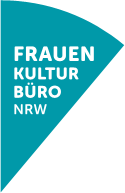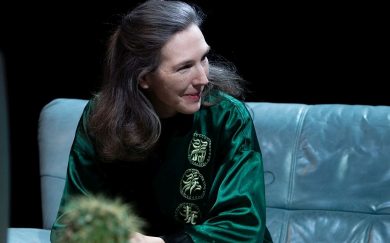Musikerin
In Aiken im US-Staat South Carolina geboren, absolvierte Helen Bledsoe ihre musikalische Ausbildung in Pittsburgh, Indiana und Amsterdam. Seit 1994 lebt sie in Europa. Sie gewann den ersten Preis beim Internationalen Interpretenwettbewerb Gaudeamus und ist heute als Solistin, Ensemble-Spielerin, Lehrerin, Improvisatorin, Autorin und Schöpferin experimenteller elektronischer Werke tätig. Zudem coacht sie das Jugendensemble Studio Musikfabrik und ist Dozentin für die Lucerne Festival Academy. Seit 1997 ist sie festes Mitglied beim Ensemble Musikfabrik. 2020 erhielt sie als eine von drei Musikerinnen das Stipendium „Präsenz vor Ort“.
FKB: Helen, when you look back on last year, what did the stipendium „Präsenz vor Ort“ allow you to achieve?
Helen: For more than ten years, I had been planning to make 2020 a kind of sabbatical year. However, in 2019, it was clear to me that this would not be possible financially. So when I received the call that I won the stipendium, I nearly wept for joy and relief. The stipendium brought me two important things: more family time and the time to further my artistic development, part of which is my instrumental practice as a flutist and an amateur harpist, the other part being my education as a producer and composer of electronic music.
In addition I was not forced to take risks with my family’s health during the relaxation of the lockdown in the autumn. There was a dangerous poker game going on then; festivals were taking place in Germany and France despite risks. If you cancel because didn’t want to take the risk, you didn’t get paid, but if the festival was canceled, you did get paid (some), so it was a waiting game to see who would fold first. I was glad to not always have to play, to be able to stay at home and keep my family safe.
FKB: Are you as a member of Ensemble Musikfabrik entirely focused on new music or are you engaged as a soloist in other musical areas?
Helen: Not very often. I studied Baroque music on the traverso and Carnatic (South Indian) music but never perform these as a soloist. A great thing I enjoy about new music today is its heterogeneity, so as a new music ensemble player I often take part in crossover projects that intersect with other styles, be it baroque, pop, rock, or non-Western music. That takes care of my musical Wanderlust. But my real passion outside of Western Classical Contemporary music is free jazz and free improvisation. I am always looking for more opportunities as an improvisatrix. For ten years I performed regularly with Russian pianist Alexei Lapin. In normal times my family spends 4 – 6 weeks in Russia per year, so Alexei and I performed numerous concerts in St. Petersburg and Moscow, and made several CDs with Leo Records. Unfortunately, Alexei gave up music because living as a freelance musician in Russia is mega difficult. I see him as a victim of the times and a society that does not support its freelance scene.
Perhaps my urge to pursue electronic music served a need to fill this gap. Since I have not found such a solid living musical partner, I must rely on myself and find an extension of my own sounds to play with.
FKB: What was your working life like before Corona, and how does it look now after a year into the pandemic?
Helen: Well, I have been touring less anyway since the birth of my son 12 years ago. But my working life before Corona still did include a lot of travel with ensemble work, workshops and masterclasses, and one or two solo projects per year. Now I am playing in a lot of video productions (concerts as well as tutorials) and have been involved in a number of online workshops. That this can all take place in Cologne is a bonus for me, especially since my son has to study at home.
My working life now includes much more study. I spend a lot of time learning audio and visual software. I am also researching solutions for finding a notation of electronic sounds and graphics for improvisation. Sporadically, I take private composition lessons with Stefan Prins, who is professor in Dresden. He also came to composition through performance, so I find him the right choice for me at this time. I really enjoy studying at home along with my son, and to my delight we can help each other – I help him with English, Latin and music mostly, and he seems to have a natural gift for understanding computer software.
FKB: Present conditions require the use of digital formats in order to reach the public. What are your experiences with these? To what extend will you use the internet after the pandemic?
Helen: My experiences have been mixed. In February the Musikfabrik played a “live” concert in Kanagawa, Japan with a Noh singer. On the one hand, it was great to perform this music and work with my colleagues live from the comfort of our Cologne studio. But of course, there was no real cultural exchange, and because of the time difference, we finished the concert at 10:00 am! No celebrating either, which is something that is sorely missed. Every video production ends in an anticlimax since there is no socializing with the public, colleagues and organizers.
However, there are other forms of collaboration and outreach that work well over the internet, so I hope to continue to use them. After all, it is not just a pandemic that keeps people from traveling. Although internet platforms such as Zoom are terrible for audio, they are great for sharing visual information. I have spent a good deal of time preparing presentations for flutists and composers, so I hope to use them in future virtual workshops. Ideas and files can also be easily shared, which makes collaborative electronic music composition possible. My project “Time Bomb” with bassoonist Lorelei Dowling is being realized at a distance this way, I send her ideas of what to play, she sends me audio files, I re-work them and send them back to her for feedback.
FKB: Your concert performance “Gesicht Gesang”, which should have taken place in Cologne live in the series of the FKB stipendium winners, is still available as a video on our website. Could you tell us something about the inception and content of this piece?
Helen: It started in the winter of 2012 when I attended the festival “100 Years of Russian Futurism” in St. Petersburg. The iconoclastic ideals of the Russian Futurists have always fascinated me. Whereas the Italian Futurists promoted real violence and war, the Russians were more interested in overthrowing the morbidity of academic establishment. Later, in the summer of 2018 I was in Russia, feeling very depressed about world politics and having no concerts with Alexei. I obsessed with thoughts of collapsed civilizations, political oppression and film as a medium of protest. Having had some experience putting music to film, I decided to go deeper into the digital world, exploring digital audio workstations, spectral granulation, and other techniques. While in the process, I forgot my depression. It became an antidote. Since then I have had the dream of expressing the ideas of Russian futurism with the new sounds I was creating, in the hope that they could be combined visually either through film or dance.
When it came to finding a source of inspiration for a piece, futurist poet Velimir Khlebnikov was an obvious choice. His poetry is quite synaesthetic and he believed that the phonemes of speech have deep universal meanings beyond individual languages; they are a unifying factor of humanity. I don’t agree with this linguistically, but I love the idea nonetheless. And I loved the idea of combining poetry with musical improvisation and electronic sounds. Sun Ra and Ted Milton (from the band Blurt) are several musicians who I think do this in very interesting and inspiring ways. However, I went in another direction in “Gesicht Gesang” and did not quote Khlebnikov’s text in the music. Instead, I chose an early poem of his as a musical structure. The spoken text was then sampled and mixed with flute sounds.
FKB: The freelance cultural scene has suffered enormously from the consequences of Corona. What helps you personally in this terrible time?
Helen: Seeing signs of solidarity among artists, signs of continuing growth of the acceptance of women in leading roles (I have a lot of thoughts about that but it would require a separate interview!). The support of my husband and son. The generosity of many people who are sharing their knowledge be it through free tutorials, Ebooks, or workshops. I think it lifts everyone’s heart to learn something new, and I hope in this time I can also make others happy by sharing my knowledge.
Bild: Helen Bledsoe, Foto: Hans Fahr

